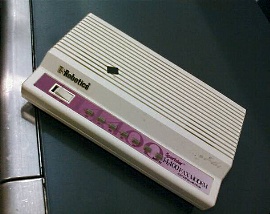 Back in the early 90's, Marcus worked for a company we'll call SuperbNet. They were the European equivalent of CompuServe and a boasted a continent-wide network that you could dial-in to to post messages, share pictures, chat interactively, and so on. But unlike CompuServe, SuperbNet's infrastructure was built for reliability using specialized Tandem servers that could never fail.
Back in the early 90's, Marcus worked for a company we'll call SuperbNet. They were the European equivalent of CompuServe and a boasted a continent-wide network that you could dial-in to to post messages, share pictures, chat interactively, and so on. But unlike CompuServe, SuperbNet's infrastructure was built for reliability using specialized Tandem servers that could never fail.
For years, users were thrilled to pay upwards of $10/hr (on top of any long-distance charges) to access SuperbNet, and SuperbNet's Tandem systems — programmed with a customized version of FORTRAN — ran wonderfully. Because nothing ever seemed to break, the system was designed to go back years upon years to see everything that had ever been posted since first going online. It was as perfect of a world as could be. That is, until this thing named the "Information Superhighway" came along.
Re-Engineering the Wheel
Each month, more and more SuperbNet users were asking about the Internet. Some wanted to know what it was about while others demanded access to it. In neither case were the SuperbNet reps able to help. By the time customers started canceling their accounts, management took notice and decided to investigate what the Internet was all about.
The first thing management learned was that the Internet would not run on their venerable Tandem servers. Apparently, the Internet was built on Unix and if they wanted it, they'd have to upgrade. And they really wanted it. So they upgraded: each Tandem box would be replaced by a state-of-the-art Dual Pentium 60mhz running the state-of-the-art SCO Unix.
At least, that was the theory. As it turned out, SuperbNet's developers didn't really have any Unix systems background, nor did porting a custom FORTRAN compiler prove to be an easy task. So they coded. And they coded some more. And they coded and coded and coded until they had finally could compile their FORTRAN compiler in Unix and, as a result, compile their system on Unix. After quite a many months, things fell into place and they finally had something that resembled the current system.
Well, it kind of resembled the current system: a whole bunch of features were gone and those that remained ran really slow. The slowness wasn't a big deal: SuperbNet's userbase was shrinking and they could always add more servers. But the missing features started to become a problem: as it turned out, users really did like searching through years of old postings and they also liked sending each other files in formats other than BinHex. But most importantly, they really liked sending email.
One of the old system's main strengths was that it was able to tackle any kind of email messaging under the sun, from ARPANET to X.400. So long as it was publically accessible, there was some way to send and receive messages. However, when they did the Unix port, their old email system just wasn't working. It was something about low-level networking protocols.
Fortuntely, Unix and the Internet had already developed the gold standard for sending electronic mail over the Internet, sendmail. Unfortunately, no one at SuperbNet had any clue how to use it or, really, how it was even supposed to fit in to their system.
"So how do we get a sendmail," one of the programmers asked.
Another programmer confidently responded, "it comes on the Internet, which we have now."
"Okay," the programming manager chimed in, "but SCO said they do not support the Internet."
There was a bit of a paused. "Hmm," the first programmer replied, "I guess I can call. Does anyone have the phone number of the Internet so we can order a sendmail?"
Not surprisingly, no one was able to find the Internet's phone number. And although they were able get sendmail working eventually, it didn't make a whole lot of difference. By that point, proper ISPs were starting to appear and SuperbNet, who could not quite adapt to the "unlimited monthly" plans, ended up fading into a memory.

